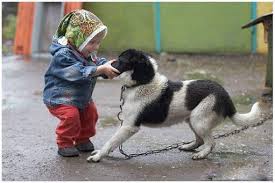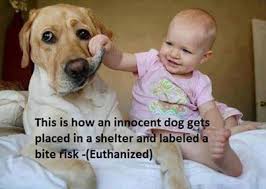Do Animals Get Dementia?
Dr. Jennifer Bolser, Humane Society of Boulder Valley in Colorado
 Dr. Jennifer Bolser confirms that our dogs and cats do indeed suffer from the same mental disabilities that humans do. From depression to OCD, some of the same medicines we use are also valid for our companion animals.
Dr. Jennifer Bolser confirms that our dogs and cats do indeed suffer from the same mental disabilities that humans do. From depression to OCD, some of the same medicines we use are also valid for our companion animals.
In humans, Alzheimer's disease accounts for up to 80-percent of all dementia cases, in which mental abilities decline and impede daily functioning. But what about our aging animals?
Dr. Bolser explains that in animals, it is called cognitive dysfunction syndrome, which is similar to Alzheimer's. The decline in the brain and the changes that occur in the brain in canine cognitive dysfunction syndrome is similar to what happens to people with Alzheimer's. These changes in the brain occur as animals age, which can cause a decrease in sensation and awareness, similar to what Alzheimer's patients experience.
 So can our dogs and cats forget who we are? Dr. Bolser explains that in some extremes cases, yes. In some cases, they can start to lose their relationships with their family or other animal members in their families. You may also see a decreased social interaction that may also appear in some extreme cases of cognitive dysfunction syndrome. So is it that they forget who we are? Dr. Bolser says no one knows for sure, but they aren't aware and their brain is not processing their social interactions like it was before.
So can our dogs and cats forget who we are? Dr. Bolser explains that in some extremes cases, yes. In some cases, they can start to lose their relationships with their family or other animal members in their families. You may also see a decreased social interaction that may also appear in some extreme cases of cognitive dysfunction syndrome. So is it that they forget who we are? Dr. Bolser says no one knows for sure, but they aren't aware and their brain is not processing their social interactions like it was before.
Our animals are living longer than ever, so we are seeing more cognitive dysfunction syndrome in our pets. The cognitive dysfunction syndrome that occurs is because of the slow degenerative process of the brain, which occurs with time. So the longer an animal lives, or even people live, more degenerative changes will be seen in the brain. With good veterinary care and other therapies to help manage different medical disorders, we can have our domesticated pets live a lot longer.
What about animals in the wild, do they also suffer from cognitive dysfunction syndrome? Dr. Bolser says likely they can and their brain can go through the degenerative process just like domesticated animals. However, in the wild, as soon as they are going to lose any cognitive abilities such as reasoning or hunting, they won't survive.
 Can our pets also suffer from obsessive-compulsive disorders (OCD)? There are some dogs that can have OCD characteristics just like people. One of the most common signs of OCD in dogs is as simple as excessive licking, especially of a paw. Less common signs are circling and pacing, if an animal is not getting enough mental stimuli. These behaviors can be managed with similar human medications. Along with medications, there are behaviorists and trainers who can help with these conditions.
Can our pets also suffer from obsessive-compulsive disorders (OCD)? There are some dogs that can have OCD characteristics just like people. One of the most common signs of OCD in dogs is as simple as excessive licking, especially of a paw. Less common signs are circling and pacing, if an animal is not getting enough mental stimuli. These behaviors can be managed with similar human medications. Along with medications, there are behaviorists and trainers who can help with these conditions.
Do our pets also get depressed? Dr. Bolser says they do, and that they do use anti-depressants in animals for behavioral things. Dr. Bolser doesn't feel it is truly depression, and that that would be projecting a human disease on to an animal. However, human anti-depressant drugs are used for anxiety issues in dogs and cats.
Visit Website
Didn't See That Bite Coming? Look A Little Harder!
Nina Stively, DogTime
 There was a dangerous Internet video fad that unfortunately became popular. The scenario was often a baby or child playing with a dangerous or aggressive dog. DogTime's Nina Stively explains how the urge to create a viral video can put our children in harms way.
There was a dangerous Internet video fad that unfortunately became popular. The scenario was often a baby or child playing with a dangerous or aggressive dog. DogTime's Nina Stively explains how the urge to create a viral video can put our children in harms way.
These were videos where a baby, toddler, or child was interacting with a dog in an unsafe manner and, in spite of the clear inappropriateness of the situation and the dog's many clear demonstrations of stress, an off-camera adult is holding the camera and chuckling.
Perhaps equally disturbing were the comments below each video, such as "No way a yellow Lab would hurt anyone" or "People, not all dogs have food aggression," and "Baby is in no harm." Really? No harm?
When a dog bites a child in their home we often hear, "no one ever saw it coming." Unfortunately, in many of these cases, a professional could see it a mile away if they were given the chance.
Dogs give warning signs nearly every single time before biting someone. No matter what breed, or how well trained or socialized, it is incredibly rare for a dog to bite someone actually out of the blue. But, if you are not watching for the signs, you are not listening to what your dog is so desperately trying to tell you, before he resorts to his last option - a bite.
 What are some of the signs a dog might give that they are uncomfortable? Dogs may start off with a stress yawn, following that with a wide "whale eye," pawing, a lip curl, hackles up, lunges, and a growl, and a wagging tail is not always a sign for happiness.
What are some of the signs a dog might give that they are uncomfortable? Dogs may start off with a stress yawn, following that with a wide "whale eye," pawing, a lip curl, hackles up, lunges, and a growl, and a wagging tail is not always a sign for happiness.
Nina tells us to look at it this way, if you were out on the street and saw a stray dog walking around, would you do things to this dog that you let your child do to yours? If the answer is no, then you shouldn't let your child do it to your own dog as well.
But, unfortunately, this scenario is played out in the majority of more than 2 million cases of children being bitten by dogs in the U.S. every year. After a dog seriously bites a child, it is often either euthanized, or brought to a shelter where it will be labeled "aggressive with children," even if the dog was begging and pleading for your intervention before the bite occurred. Regardless of breed, a dog with a bite history can be a tremendous challenge to place in a home and is often put down.
Visit Website
Second Hand Smoke Sickens Pets - Dr. Debbie
 Looking to save money on veterinary care or wondering how to keep your pet in peak health? If you are a smoker and have pets, there are some very compelling reasons to quit - second hand smoking's link to causing cancer and illness in pets. If threats from your spouse haven't gotten you to stop smoking yet, maybe looking at that furry friend on the couch next to you will. The life you save may be his.
Looking to save money on veterinary care or wondering how to keep your pet in peak health? If you are a smoker and have pets, there are some very compelling reasons to quit - second hand smoking's link to causing cancer and illness in pets. If threats from your spouse haven't gotten you to stop smoking yet, maybe looking at that furry friend on the couch next to you will. The life you save may be his.
It's long been known that smoking causes serious health repercussions in people, even to non-smokers in the same environment. According to the Center For Disease Control (CDC), secondhand smoke contains 7,000 different toxins, hundreds which are toxic and 70 which cancer-causing.
In people, secondhand smoke is linked to cardiovascular disease, lung cancer and childhood asthma, ear infections and Sudden Infant Death Syndrome (SIDS). Similar research in pets has found that animals from smoking homes are at greater risk of chronic lung disease like asthma and bronchitis, respiratory cancers and other cancers.
Pets are exposed to smoke and chemicals not only through inhaling air, but also by ingesting the toxins directly. Smoke particulates settle on pet's fur or are transferred from the owner's hands through petting. Pets then ingest cigarette's toxins through licking humans, self-grooming and grooming other household pets. Cat's especially fastidious nature permits increased intake of smoke residues through kitty grooming behaviors.
What Are Secondhand Smoke Effects In Pets?
Research from Tufts University discovered that cats exposed to smoking had a higher risk of developing the malignant cancer, lymphoma. In fact, cats living in smoking homes had double the risk of developing lymphoma as cats from non-smoking homes. When two people in the home smoked, the risk of lymphoma in cats increased to four times.
Other veterinary research identified increased rates of oral, nasal and lung cancer in pets from smoking households. Cats from a smoker's home are four times as likely to develop the disfiguring cancer, squamous cell carcinoma. And in yet another study, long snouted dog breeds from smoking homes were at greater risk of developing nasal cancer, likely due to greater absorption area in long nasal passages.
 How Can You Safeguard Your Pet's Health?
How Can You Safeguard Your Pet's Health?
If you are a smoker, consider stopping - for your sake and your pets. Short of giving up the habit, take steps to minimize second hand smoke on your pets. Only smoke outdoors, away from pets. Wash your hands after smoking, before handling your pets. If you enjoy lighting up in the car when driving, leave your pet at home. Even with car windows down, cigarette smoke inside a car creates a toxic environment for pets.
Have your dog and cat examined by your veterinarian every six months. Alert your veterinarian to any lethargy, trouble breathing, and coughing or unexplained weight loss. Early detection and treatment permits the most effective treatment of chronic respiratory conditions and cancers. Your pet's veterinarian can detect illness through regular exams and preventative screenings.
While smoking isn't the only factor causing cancer in pets, it is increasingly scrutinized as a significant health risk, one that we humans can control. The health decisions we make not only influence our children's health, but also affect those devoted pets that warm our hearts and beds.
Featured veterinarian known as "Dr. Debbie" on national pet radio program, Animal Radio. Ebook author of "Yorkshire Terriers: How to Be Your Dog's Best Friend"; "Pugs: How to Be Your Dog's Best Friend"; "Mini Schnauzers: How to Be Your Dog's Best Friend"; and "Shih Tzu: How to Be Your Dog's Best Friend." Dr. Debbie's books.
Visit Website
Animal Radio News with Stacey Cohen
 Jail Time For Stealing A Cat
Jail Time For Stealing A Cat
A New York woman faced jail time after refusing a plea deal for stealing a cat. The woman admitted to taking a cat from a bagel shop and driving it to a local animal shelter. She believed the resident cat was being abused because of sores on its ears and its scruffy looking fur. She was later arrested and charged with burglary. While she didn't deny taking the cat, she rejected a plea bargain because she didn't feel she did anything wrong. The deal would have dismissed the charges and kept her out of jail if she stayed out of trouble for the next six months. Instead, she wanted to take the case to trial, risking up to seven years in prison if she was found guilty.
Man Adopts Cats To Eat Them
An Italian man faced jail time after allegedly adopting cats for the purpose of eating them. The 50-year-old man adopted at least 15 cats over several months under the guise of being a cat lover. While his ruse fooled authorities for a bit, they became suspicious after he began coming up with excuses to get out of routine welfare checks on the animals. Officials decided to stop by his house unannounced and reportedly "caught him in the act" of preparing to kill a cat. After being arrested, the man admitted to killing the cats he adopted and eating them, sometimes with friends taking part in the meals. He was taken into custody for maltreatment of animals.
 Village Residents Adopted Abandoned Pig
Village Residents Adopted Abandoned Pig
Residents of a small English village said a lonely abandoned pig turned into a local attraction when they all adopted her. The porker was left behind after her owners moved away. After a few months of letting the pig wander around the field, the villagers decided to take action. They built a makeshift shelter and donated food. People came in droves to drop off vegetable and other goodies and to visit with the pig.
Pet Detective Finds Missing Dogs
A dog owner was reunited with his pets after enlisting the help of pet detectives. The two dogs were stolen from a summer home. The owner got in touch with Wales-based business Stolen and Stray Pet Recovery to help find his pets. After two weeks, the detectives tracked down the dogs. They were nearby and it was believed they may have been stolen for breeding. The hunt for the dogs was shared through social media with more than 1,800 Facebook users liking the page.
 Listen to the entire Podcast of this show (#1293)
Listen to the entire Podcast of this show (#1293)





